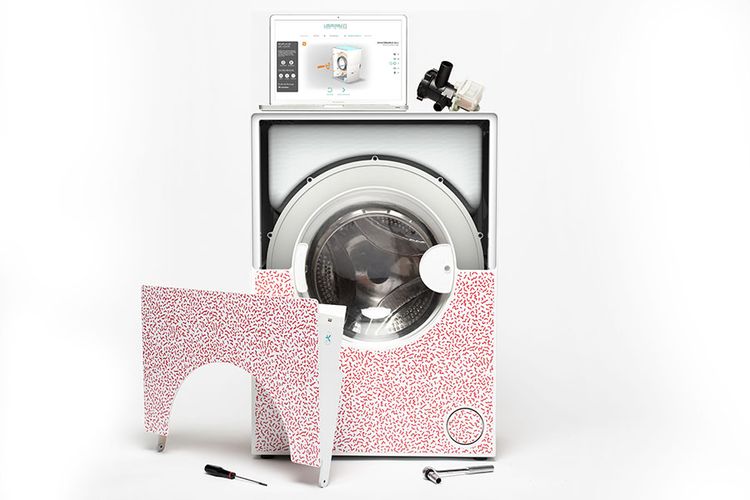Not a terribly exciting or engaging image, I have to admit, lifted, though, from this post on Libération yesterday morning in the course of the daily read-around. I’ve been engaged in the process of writing an Energy Descent Action Plan for out local Transitions initiative, a process that seems to drag on and in which few seem keen to participate, but one of the recurring themes is that we use too much of just about everything, and much of our usage is wasteful, literally, as we purchase and use goods that are built to fall apart or become obsolete and require replacement. I suspect that many of us have had the experience of having to replace a relatively recent major appliance because of the failure of an electronic module or because there are already no replacement parts available. Almost equally pernicious is the situation where an item can be repaired, but where the cost of doing so makes for little economic advantage over simply throwing it out and buying a new one. Hence the “excitement” over the above image, as it represents a washing machine labelled by its designer as “L’Increvable” , which is more or less meant to convey the idea of bullet-proof. His idea is that the machine should last a lifetime, that it should be user-serviceable (given a certain level of tool savvy), and that all parts be easily replaced and repairable. This way of doing things is a fair approximation of the opposite of the way most design and manufacturing is done, our current mode being predicated on an unlimited stream of materials and energy and a sucker population willing to accumulate large amounts of valuable material in landfills. Clearly, our current mode is suicidal as we move toward a world population of eight billion and as more and more of the world’s inhabitants are less and less willing to accept the deprivations of poverty to supply the consumer society in other parts of the world.
There rests the question of developing a species-wide awareness and ethos that will allow for a decent life for all. Can we dial back on our consumption so that others might have the wherewithal to live a life without want? Current indicators don’t hold out a lot of hope, particularly when the people in charge of the zoo seem set on a path of division and a desire to sequester as much of the available store of resources as possible for the use of a chosen few. It’s difficult to imagine the mass of humanity developing the mutual aid outlook as long as that mass is scrambling just to survive and facing interference and opposition form the people they should be helping and who should be returning the favour.
One of the best ways to reign in our over-consumption is to build durable, repairable and recyclable goods, and to encourage others to do the same. The insane chase after levels of material wealth that we’ve been sold is best illustrated in the tech sector where whatever gadget you buy is out of date about the time you finish the transaction to remove it from the store. New software requires the purchase of new hardware, and hardware seems to generate the need for software upgrades as tech companies bootstrap the upgrade ladder to waste and obsolescence. The same phenomenon appears in most phases of our existence, where single-serve coffee makers replace other methods of brewing that are perfectly adequate, but just aren’t the latest fad. This, of course, follows on the notion that we should have uninterrupted access to the beverage of our choice at all hours of the day and night, and we’re trained from an early age to expect this pampering because we deserve to have only the best. We just don’t stop to ask ourselves what that “best” is as we abandon civic duty and critical analysis in favour of accumulation.
Those of us who live in the lap of some version of North American luxury can celebrate the creation of a truly durable washing machine, but that celebration is also about having clothes to wash, an abode to house the machine, the clothes, and us, and clean water to do the washing, along with a host of other pre-conditions that don’t hold in many places in the world. Recently, my brother told me he had to replace the speed control on his stand mixer, and that he had to rig up a rheostat arrangement because there didn’t seem to be any parts of this particular machine. I had been through a similar vexation with a dishwasher three or four years ago, though that’s where the similarity ends. The dishwasher was less than three years old and no parts could fix it. It has become a dish drying rack for dishes we wash by hand and we seem to be none the worse for it. The stand mixer was purchased in 1950, and, with the installation of the rheostat, is now fully functional. Perhaps l’Increvable is a sign of a return to an outlook that will allow us a little breathing room in our quest to balance our lives in a way that will see future generations stretching our for centuries. Without that rebalancing, the prospects for life beyond a generation or two seem pretty discouraging. Too bad for us.
Living as if there were no tomorrow, we are converting a carefree metaphor into a self-fulfilling prophecy.
—John Whiting
One who knows “enough is enough” always has enough.
—Tao Te Ching

